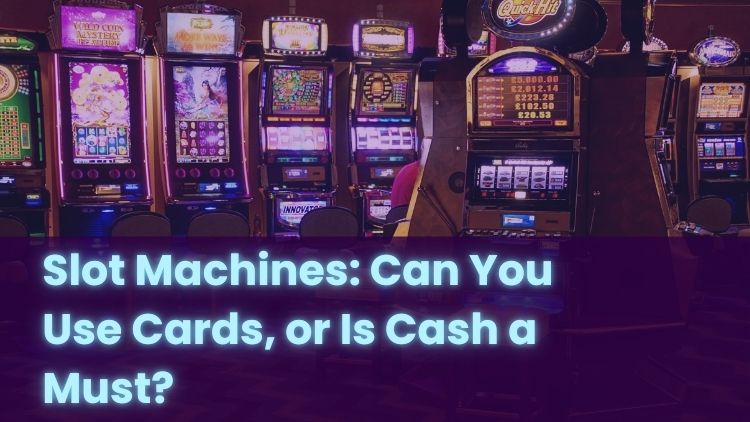
Slot machines are a well-known feature of many casinos, but if you’ve never played before, you might be unsure how payments actually work. With technology changing how people pay for almost everything, it’s natural to wonder whether coins and notes are still needed, or if cards are now accepted too.
Whether you’re planning a visit to a UK casino or thinking about trying online slot games, understanding payment options could help you feel more confident and avoid confusion. Read on to learn more.
How Do Slot Machines Accept Payments?
In land-based UK casinos, slot machines typically accept paper notes. Most machines take £5, £10 and £20, with a printed ticket issued when you cash out. That ticket can be exchanged at a pay-out kiosk or with staff. Coins are less common than they used to be, as many venues now use ticket systems.
Some casinos are introducing card payments and digital wallets. Where available, debit cards usually top up a casino card or a ticketing balance rather than paying the slot directly.
Online slots work through your account balance. You can deposit using a debit card, bank transfer or an e‑wallet, depending on what the site supports. ID and age checks are part of the sign-up process, and licensed operators clearly list which payment methods they accept.
If you do decide to try your hand at slot games, remember to do so responsibly and within your means; never wager more than you can afford to lose.
Do Slot Machines Take Credit or Debit Cards?
Credit cards cannot be used for gambling in the UK, including slot machines in casinos and online. This legal ban is designed to prevent spending on borrowed money.
Debit cards may be used in land-based venues, although often not at the machine itself. Instead, casinos might offer a kiosk or cashier where you load funds onto a casino card or ticket that can be used across machines. Some venues also run cashless gaming terminals. The setup varies, so it might be worth checking how payments work before you play.
Online, deposits by debit card are widely supported, while credit cards are blocked. Sites list their available payment types on the banking page, along with any fees or limits.
Why Do Some Slot Machines Still Require Cash?
Plenty of slot machines still rely on cash for a few practical reasons. Many venues operate long-serving machines that predate modern cashless systems. Replacing or retrofitting them can be costly, so operators keep reliable cash-based models in use. These machines usually accept £5, £10 and £20 notes and print a voucher for any remaining credit.
Some players prefer cash because it feels more tangible. Physically seeing money go in and a ticket come out could help certain people keep track of what they are spending without linking a bank account.
Regulatory requirements also play a part. Casinos must meet strict standards on payments, customer checks and anti‑money‑laundering controls. For some venues, cash remains a straightforward way to align with those rules while they upgrade systems.
Are There Limits on Card Payments for Slots?
Yes. Alongside the ban on credit cards, there are typical limits and safeguards when using debit cards. Casinos and online sites often set minimum top-ups, commonly £5 or £10, and may apply daily or weekly caps. Policies vary between operators, but they are designed to help people manage how much they choose to spend.
Online accounts include safer gambling tools that let you set deposit limits by day, week or month. Some banks also allow customers to block or restrict gambling transactions at account level. If you want to know the exact thresholds at a particular venue or site, it might be a good idea to check the banking page or ask staff.
Cashless Slot Machines in the UK: What to Expect
Cashless options are becoming more common. The most widespread is ticket‑in, ticket‑out, often called TITO. You load funds at a kiosk or cashier, play, then receive a printed ticket showing your remaining balance. That ticket can be inserted into another machine or redeemed at a pay-out kiosk. It speeds things up and reduces the need to handle coins.
Some casinos issue a reusable card that holds your balance. You can add funds with a debit card or cash at a kiosk, then tap or insert the card at compatible machines. Mobile payments may be supported in certain venues, though availability varies. Where higher limits or electronic payments are involved, expect to be asked for ID, which helps venues meet their compliance obligations.
All of these systems must meet regulatory standards around security, customer protection and crime prevention. Not every venue has moved to cashless setups, so it might be a good idea to check what is available before you visit.
What Are the Risks of Using Cards on Slot Machines?
Paying by card can make spending feel more abstract. Without physical cash changing hands, some people find it harder to notice how much they have used. That can lead to going over a personal budget if there are no limits in place.
Electronic transactions also require sharing payment details. Licensed operators use encryption and other security measures, but no online system is completely risk‑free. Keeping account details private, using trusted payment methods and monitoring statements could reduce exposure to fraud.
Easy access to funds can increase the temptation to top up quickly. Most sites offer tools such as deposit limits, time‑outs and self‑exclusion, which are there to help people stick to their own boundaries.
**The information provided in this blog is intended for educational purposes and should not be construed as betting advice or a guarantee of success. Always gamble responsibly.
*All values (Bet Levels, Maximum Wins etc.) mentioned in relation to these games are subject to change at any time. Game features mentioned may not be available in some jurisdictions.
